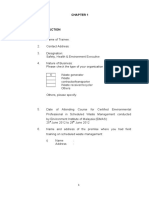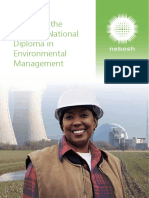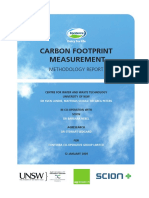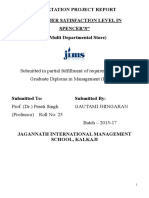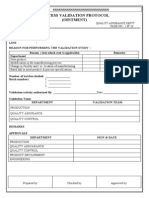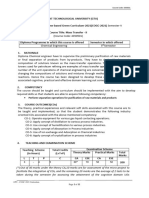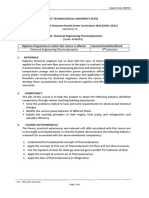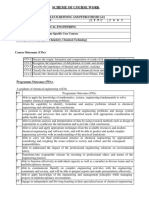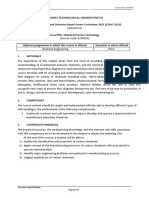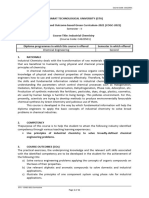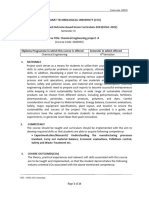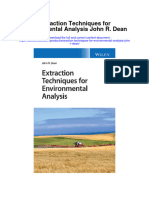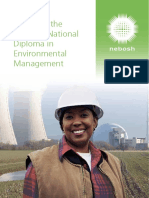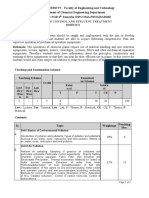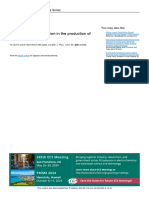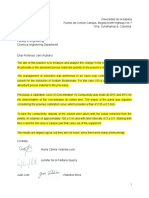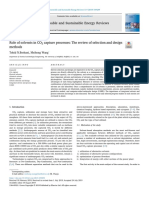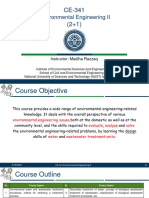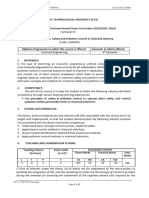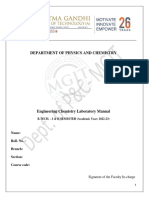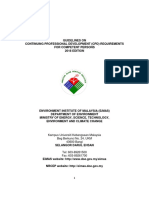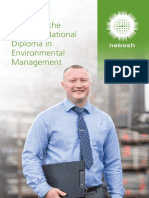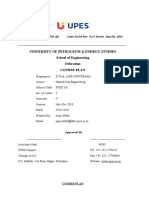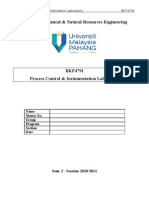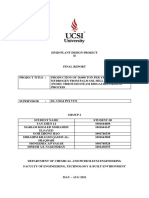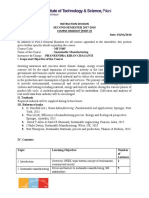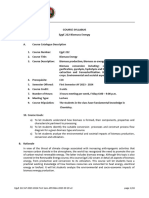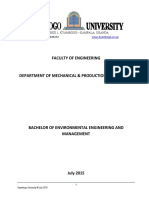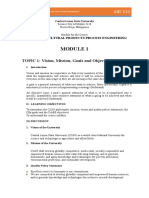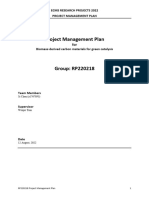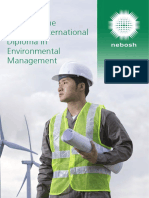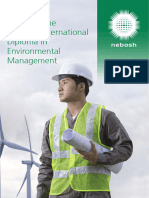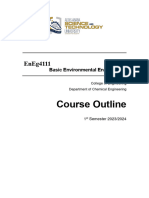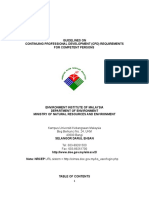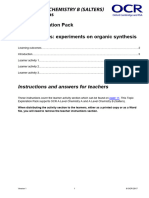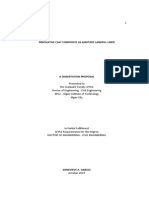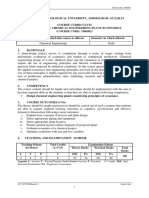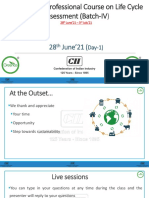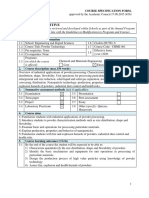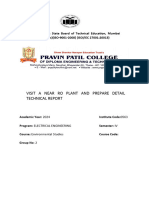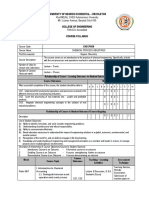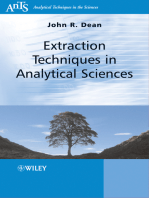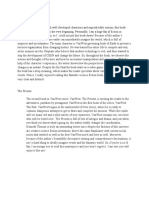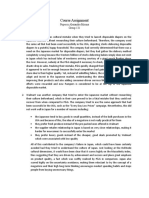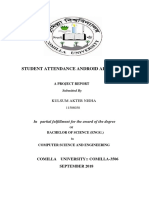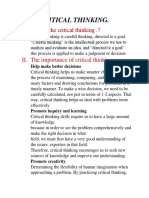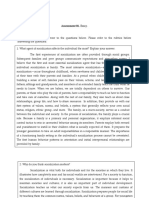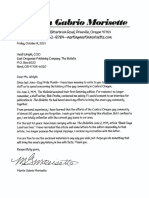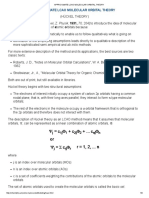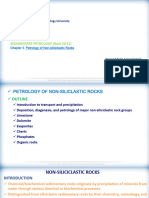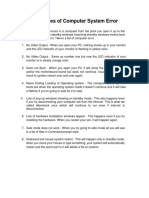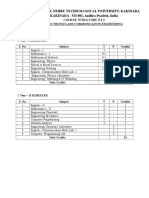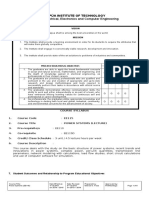Plant Utilities
Plant Utilities
Uploaded by
tdhyey63Original Description:
Original Title
Copyright
Available Formats
Share this document
Did you find this document useful?
Is this content inappropriate?
Report this DocumentCopyright:
Available Formats
Plant Utilities
Plant Utilities
Uploaded by
tdhyey63Copyright:
Available Formats
Plant utilities Course Code: 4330505
GUJARAT TECHNOLOGICAL UNIVERSITY (GTU)
Competency-focused Outcome-based Green Curriculum-2021 (COGC-2021)
Semester-III
Course Title: Plant Utilities
(Course Code: 4330505)
Diploma programmer in which this course is offered Semester in which offered
Plant Utilities Third
1. RATIONALE
Diploma chemical engineer has to ensure smooth and proper operation of utilities and
auxiliaries’ plants such as steam, compressed air, instrumental air, inert gases, DM water and
chilled water. These utilities are essential for manufacturing different chemical products. Use
of concept of energy efficiency and green chemistry are necessary for energy conservation in
chemical plant for producing materials of desired quality and to maintain plant safety. Hence
the course has been design to develop these competencies and its associated cognitive and
effective domain learning outcomes.
2. COMPETENCY
The course should be taught and implemented with the aim to develop required skills
in students so that they are able to acquire following competency:
Use different utilities in chemical process plants for various applications.
3. COURSE OUTCOMES (COs)
The practical exercises, the underpinning knowledge and the relevant soft skills
associated with the identified competency are to be developed in the student for the
achievement of the following COs:
a) Select Various Methods For Water Softening And Purification.
b) Explain Different Types of Steam Generators and Compressors along with their
components.
c) Select Refrigeration For Various Applications.
d) Apply concepts of energy efficiency and green chemistry for conservation of utilities.
4. TEACHING AND EXAMINATION SCHEME
Teaching Scheme Total Credits Examination Scheme
(In Hours) (L+T+P/2) Theory Marks Practical Marks Total
L T P C CA ESE CA ESE Marks
2 0 0 2 30 70 0 0 100
(*): For this practical only course, 50 marks under the practical CA have two components i.e.
the assessment of micro-project, which will be done out of 10 marks and the remaining 15
GTU - COGC-2021 Curriculum
Page 1 of 8
Plant utilities Course Code: 4330505
marks are for the assessment of practical. This is designed to facilitate attainment of COs
holistically, as there is no theory ESE.
Legends: L-Lecture; T – Tutorial/Teacher Guided Theory Practice; P -Practical; C – Credit,
CA - Continuous Assessment; ESE -End Semester Examination.
5. SUGGESTED PRACTICAL EXERCISES
Following practical outcomes (PrOs) are the sub-components of the Course Outcomes (Cos).
Some of the PrOs marked ‘*’ are compulsory, as they are crucial for that particular CO at the
‘Precision Level’ of Dave’s Taxonomy related to ‘Psychomotor Domain’.
Approx.
Sr. Unit
Practical Outcomes (PrOs) Hrs.
No. No.
Required
Not applicable
Note
i. More Practical Exercises can be designed and offered by the respective course teacher to
develop the industry relevant skills/outcomes to match the COs. The above table is only a
suggestive list.
ii. Care must be taken in assigning and assessing study report as it is a first year study report.
Study report, data collection and analysis report must be assigned in a group. Teacher has
to discuss about type of data (which and why) before group start their market survey.
6. MAJOR EQUIPMENT/ INSTRUMENTS REQUIRED
These major equipments with broad specifications for the PrOs is a guide to procure them by
the administrators to user in uniformity of practical’s in all institutions across the state.
Sr. Equipment Name with Broad Specifications PrO. No.
No.
1. Not applicable
7. AFFECTIVE DOMAIN OUTCOMES
The following sample Affective Domain Outcomes (ADOs) are embedded in many of the
above-mentioned COs and PrOs. More could be added to fulfill the development of this
course competency.
a) Follow ethical practices.
b) Practice good housekeeping.
c) Demonstrate working as a leader/a team member during brain storming.
The ADOs are best developed through the laboratory/field based exercises. Moreover, the
level of achievement of the ADOs according to Krathwohl’s ‘Affective Domain Taxonomy’
should gradually increase as planned below:
i. ‘Valuing Level’ in 1st year
ii. ‘Organization Level’ in 2nd year.
GTU - COGC-2021 Curriculum
Page 2 of 8
Plant utilities Course Code: 4330505
iii. ‘Characterization Level’ in 3rd year.
8. UNDERPINNING THEORY
The major Underpinning Theory is formulated as given below and only higher level UOs of
Revised Bloom’s taxonomy are mentioned for development of the COs and competency in
the students by the teachers. (Higher level UOs automatically include lower level UOs in
them). If required, more such higher level UOs could be included by the course teacher to
focus on attainment of COs and competency.
Unit Unit Outcomes (UOs) Topics and Sub-topics
(4 to 6 UOs at Application level)
Unit – I 1.a Explain role of Utilities in
Water as Chemical Plant 1.1 List and use of various utilities in
Basic Utility 1.a.1 List various utilities in chemical plant
chemical plant & uses 1.2 Sources of water
1.b List sources of Water 1.3 Hard & Soft water
1.c Differentiate types of 1.4 Boiler Feed water and
Water demineralized water
1.d Compare Softening 1.5 Methods of water softening
processes of water processes
1.e Explain the process of 1.5.1 Lime soda process (Hot &
Purification of water. Cold)
1.f Classify conventional and 1.5.2 Zeolite process
green techniques for 1.5.3 Ion exchange process
sterilization of water. 1.5.4 Phosphate process
1.6 Purification of water
1.6.1 Screening
1.6.2 Sedimentation
1.6.3 Coagulation
1.6.4 Filtration
1.6.5 Sterilization
1.7 Conventional techniques
1.7.1 Sterilization by chlorine
1.7.2 Sterilization using
bleaching powder
1.7.3 Sterilization by
chloramines solution
1.8 Green techniques
1.8.1 Sterilization using UV rays
1.8.2 Sterilization using Ozon
GTU - COGC-2021 Curriculum
Page 3 of 8
Plant utilities Course Code: 4330505
Unit Unit Outcomes (UOs) Topics and Sub-topics
(4 to 6 UOs at Application level)
Unit – II 2.a Explain uses of utilities like 2.1 Use of Steam, Air & Inert Gases
Steam, Air & Steam, Air & Inert Gases as utilities
Inert Gases 2.b Define properties of steam 2.2 Properties of steam
2.c Label the different part of 2.2.1 Enthalpy
steam generator 2.2.2 Wet steam
2.d Classify steam generator 2.2.3 Saturated Steam
2.e Compare steam generators 2.2.4 Superheated steam
2.f List the Factors affecting 2.2.5 Specific volume of steam
selection of Boiler 2.3 Steam Generator : Classification,
2.g Describe boiler accessories comparison , components, steam
and mountings for handling, condensate removal
improving efficiency and 2.4 Factors affecting selection of
conservation of energy. Boiler
2.h Discuss utility air 2.5 Boiler Accessories and
2.i Describe the working mountings
principle, application of Air 2.5.1 Air Pre heater
2.5.2 Super heater
compressors – 2.5.3 Economizer
2.i.1 Explain energy efficient 2.5.4 Steam trap
alternative 2.6 Utility air
2.j Describe properties of Inert 2.6.1 Compressed Air
gases 2.6.2 Blower Air
2.6.3 Fan Air
2.6.4 Instrumental air
2.7 Types of Air compressors
2.7.1 Reciprocating Air
compressors
2.7.2 Rotary compressors
2.8 Energy efficient air compressor
2.8.1 Multistage compressors
2.9 Inert gas - Nitrogen, Argon
Unit – III 3.a Explain the working principle 3.1 Concept of refrigeration
Refrigeration of Refrigeration 3.2 Methods of Refrigeration
3.b Distinguish methods of 3.2.1 Ice Refrigeration
Refrigeration 3.2.2 Evaporative Refrigeration
3.c Describe and TOR of 3.2.3 Vapor Refrigeration System
refrigeration 3.3 TOR of refrigeration
3.d Use primary and secondary 3.4 Types of Primary Refrigerants
Refrigerants and list out 3.4.1 Ammonia
3.4.2 Halo Carbons (Freon of
green refrigerants
Different type)
3.d.1 Explain advantages of green 3.4.3 HFC (Hydro Fluorocarbon)
refrigerants over 3.5 Types of secondary Refrigerants
conventional refrigerants 3.5.1 Water
3.5.2 Brine
3.6 Selection of Refrigerants
GTU - COGC-2021 Curriculum
Page 4 of 8
Plant utilities Course Code: 4330505
Note: The UOs need to be formulated at the ‘Application Level’ and above of Revised Bloom’s
Taxonomy’ to accelerate the attainment of the COs and the competency.
9. SUGGESTED SPECIFICATION TABLE FOR QUESTIONPAPER DESIGN
Unit Unit Distribution of Theory Marks
Title Teaching R U A Total
Hours Level Level Level Marks
I Water as Basic Utility 10 10 10 6 26
II Steam, Air & Inert Gases 12 10 10 9 29
III Refrigeration 6 4 6 5 15
Total 28 24 26 20 70
10. SUGGESTED STUDENT ACTIVITIES
Other than the classroom and laboratory learning, following are the suggested student-
related co-curricular activities which can be undertaken to accelerate the attainment of the
various outcomes in this course: Students should perform following activities in group and
prepare reports of about 5 pages for each activity. They should also collect/record physical
evidences for their (student’s) portfolio which may be useful for their placement interviews:
a) Undertake micro-projects in team/individually.
b) Encourage Students for creating and designing water treatment processes
using wastematerials.
c) Students are encouraged to register themselves in various MOOCs such
as: Swayam, edx, Coursera, Udemy etc to further enhance their learning.
11. SUGGESTED SPECIAL INSTRUCTIONAL STRATEGIES (if any)
These are sample strategies, which the teacher can use to accelerate the attainment of the
various outcomes in this course:
a) Guide student(s) in undertaking micro-projects.
b) Diagnosing Essential Missed Learning concepts that will help for students to
improve their performance.
c) Guide Students to do Personalized learning so that students can understand the
course material at his or her pace.
d) Encourage students to do Group learning by sharing so that learning can be
enhanced.
e) About 20% of the topics/sub-topics which are relatively simpler or descriptive in
nature is to be given to the students for self-learning, but to be assessed
using different assessment methods. Guide students on addressing the issues on
environment and sustainability using the knowledge of this course.
12. SUGGESTED MICRO-PROJECTS
Only one micro-project is planned to be undertaken by a student that needs to be
assigned to him/her in the beginning of the semester. In the first four semesters, the
micro-project is group-based (group of 3 to 5). However, in the fifth and sixth semesters,
the number of students in the group should not exceed three.
GTU - COGC-2021 Curriculum
Page 5 of 8
Plant utilities Course Code: 4330505
The micro-project could be industry application based, internet-based, workshop- based,
laboratory-based or field-based. Each micro-project should encompass two or more COs
which are in fact, an integration of PrOs, UOs and ADOs. Each student will have to
maintain dated work diary consisting of individual contribution in the project work and
give a seminar presentation of it before submission. The duration of the microproject
should be about 14-16 (fourteen to sixteen) student engagement hours during the
course. The students ought to submit micro-project by the end of the semester to
develop the industry-oriented COs.
A suggestive list of micro-projects is given here. This has to match the competency and
the COs. Similar micro-projects could be added by the concerned course teacher:
MICRO PROJECT 1: Identify sources of water at your college premises and
measure thefollowing physical properties.
1. Measure temperature of water.
2. Measure TDS of water.
3. Measure pH of water.
4. Measure turbidity of water.
MIICRO PROJECT 2: Perform basic treatment techniques for purification of water.
MICRO PROJECT 3: Prepare 15-20 slides presentation showing classification of
refrigeration & refrigerants.
13. SUGGESTED LEARNING RESOURCES
Sr. Title of Book Author Publication with place, year
No. and ISBN
1 Chemical Plant Utilities Sathiyamoorthy- Lambert Academic
Manickkam Publishing;India, 2016,
ISBN: 978-3-659-97828-9
2 Unit operation of Chemical McCabe, Warren L., McGraw Hill
Engineering Julian C. Smith Publication; NewYork,
7th Edition, 2004
3 Plant utilities D. B. Dhone Nirali Prakashan;
Pune, 2ndEdition,
2012
4 Power Plant Engineering P.K. Nag McGraw Hill Education;
India,4th edition, 2017,
ISBN: 978-
9339204044
5 Thermal Engineering R.S. Khurmi, S. Chand Publishing; India,
J. K. Gupta 2008,
ISBN: 9788121925730
6 Thermal Engineering R.K.Rajput Laxmi Publications;
India, 11thedition,
GTU - COGC-2021 Curriculum
Page 6 of 8
Plant utilities Course Code: 4330505
Sr. Title of Book Author Publication with place, year
No. and ISBN
2020, ISBN: 978-
8131808047
14. SOFTWARE/LEARNING WEBSITES
a. https://nptel.ac.in/courses/112/107/112107291/
b. https://www.thermodyneboilers.com/economisers/
c. https://www.steamtrapefficiency.com/wp-content/uploads/BITHERM-STEAM-
MANUAL.pdf
d. http://www.silbert.org/MSA_WT_Manual.pdf
e. http://ppuchem.blogspot.in/2013/02/unit-1-notes.html
f. https://booksite.elsevier.com/samplechapters/9780080966595/Chapter_3.pd
f
15. PO-COMPETENCY-CO MAPPING
Semester-III Plant Utilities (Course Code: 4330505)
POs
PO 5
PO 3 PO 4
PO 1 Engineering
Engineering PO 6
Competency Basic & PO 2 Design/ practices for PO 7
Tools, Project Life-long
Discipline Problem develop- society,
& Course Outcomes Experimen-
specific Analysis ment of sustainability Manage- learning
tation ment
knowledge solutions &
&Testing
environment
Competency Use different utilities in chemical process plants for various applications.
Course Outcomes
CO a) Select Various
Methods For Water
Softening And 3 2 2 1 2 1 2
Purification.
CO b) Explain
Different Types of
Steam Generators
2 1 - - 1 1 1
and Compressors
along with their
Components.
CO c) Select
Refrigeration For
Various Applications.
3 1 2 - 2 2 3
CO d) Apply concepts 3 2 2 1 3 2 3
of energy efficiency
and green chemistry
Legend: ‘3’ for high, ‘2’ for medium, ‘1’ for low and ‘-’ for no correlation of each CO with PO.
GTU - COGC-2021 Curriculum
Page 7 of 8
Plant utilities Course Code: 4330505
16. COURSE CURRICULUM DEVELOPMENT COMMITTEE
GTU Resource Persons
Sr. Name and Contact
Institute Email
No. Designation No.
1. Mr. P M Gadhiya GOVERNMENT POLYTECHNIC gadhiyapiyush53@gmai.com
RAJKOT
2. Mr. I P Dave GOVERNMENT POLYTECHNIC ipd.fetr@gmail.com
RAJKOT
GTU - COGC-2021 Curriculum
Page 8 of 8
You might also like
- Field Training ReportDocument39 pagesField Training ReportShamsul Azhar Mohd100% (10)
- NEBOSH National Diploma in Environmental Management: Guide To TheDocument53 pagesNEBOSH National Diploma in Environmental Management: Guide To TheLuizaBalanNo ratings yet
- Carbon Footprint MethodologyDocument33 pagesCarbon Footprint Methodologyryanrails100% (2)
- Dissertation Project Report On Spencer's FinalDocument95 pagesDissertation Project Report On Spencer's FinalShubhansh Sahai100% (4)
- Ointment Process Validation-OriginalDocument26 pagesOintment Process Validation-Originalasit_m100% (1)
- Waste To Energy Conversion Technology Course Code: 4350502: Page 1 of 8Document8 pagesWaste To Energy Conversion Technology Course Code: 4350502: Page 1 of 8Cliches in0% (1)
- Perform Separation Operations For Purification of Raw Materials and ProductsDocument11 pagesPerform Separation Operations For Purification of Raw Materials and ProductsCliches inNo ratings yet
- Environment Engineering and Pollution Control Course Code: 4350608Document11 pagesEnvironment Engineering and Pollution Control Course Code: 4350608Dakshraj RathodNo ratings yet
- Chemical Engineering Thermodynamics Subject Code: 4340503Document9 pagesChemical Engineering Thermodynamics Subject Code: 4340503Solanki DarshitNo ratings yet
- 19CH1153 PRP SchemeDocument4 pages19CH1153 PRP SchemeMr. G. Naga ChaitanyaNo ratings yet
- Chemical Process TechnologyDocument9 pagesChemical Process TechnologyRITZCOOL FOR YOUNo ratings yet
- Industrial Chemistry Course Code: C4320501: Page 1 of 11Document11 pagesIndustrial Chemistry Course Code: C4320501: Page 1 of 11tdhyey63No ratings yet
- DSP Theory Course FileDocument16 pagesDSP Theory Course FilecibinlalNo ratings yet
- Chemical Engineering Project - II Course Code: 4360505: Page 1 of 14Document14 pagesChemical Engineering Project - II Course Code: 4360505: Page 1 of 14Mj GohilNo ratings yet
- Extraction Techniques For Environmental Analysis John R Dean Full ChapterDocument67 pagesExtraction Techniques For Environmental Analysis John R Dean Full Chapterbarbara.heinrich849100% (20)
- TÜV SÜD Sustainability Certification Program Level 1Document3 pagesTÜV SÜD Sustainability Certification Program Level 1MIRAL JALUNo ratings yet
- Nebosh ED GUIDEDocument57 pagesNebosh ED GUIDEKevin RamanNo ratings yet
- Pollution Control and Effluent Treatment 03602267: Unit I Basics of Environmental PollutionDocument4 pagesPollution Control and Effluent Treatment 03602267: Unit I Basics of Environmental PollutionSMIT CHRISTIANNo ratings yet
- IKBP8Document7 pagesIKBP8Meiske LibbyNo ratings yet
- Cleaner Production Engineering Course Code: 4361304: Page 1 of 9Document9 pagesCleaner Production Engineering Course Code: 4361304: Page 1 of 9pakshat968No ratings yet
- Seminar Sec 1 PDFDocument9 pagesSeminar Sec 1 PDFYashodabai PadwalNo ratings yet
- Solid-Liquid Extraction Velandia, Panto y VillalobosDocument12 pagesSolid-Liquid Extraction Velandia, Panto y Villalobosjuan jose villalobos moraNo ratings yet
- Role of Solvents in CO2capture ProcessesDocument20 pagesRole of Solvents in CO2capture ProcessesTagabo AliNo ratings yet
- CE-341 Lec 1Document40 pagesCE-341 Lec 1Hexxacord The BetterNo ratings yet
- FINAL GREEN AUDIT REPORT 22-23 AT 5.42PM - CompressedDocument64 pagesFINAL GREEN AUDIT REPORT 22-23 AT 5.42PM - Compressedsubrata sarkarNo ratings yet
- Safety and Pollution Control in Chemical Industry Course Code: 4340504Document11 pagesSafety and Pollution Control in Chemical Industry Course Code: 4340504ritikmachhi7No ratings yet
- EMS Audit ChecklistDocument4 pagesEMS Audit ChecklistSyerifaizal Hj. MustaphaNo ratings yet
- Introduction To Disinfection Study Guide: Wisconsin Department of Natural Resources Wastewater Operator CertificationDocument27 pagesIntroduction To Disinfection Study Guide: Wisconsin Department of Natural Resources Wastewater Operator CertificationBuenaventura Jose Huamani TalaveranoNo ratings yet
- Desalination Plant PDR3Document66 pagesDesalination Plant PDR3jpv90No ratings yet
- EE 424 Integrated Circuits FabricationDocument7 pagesEE 424 Integrated Circuits FabricationKhalil AlluhaybiNo ratings yet
- Revised & Final Engg. Chemistry Lab Manual II SEM April 2023Document34 pagesRevised & Final Engg. Chemistry Lab Manual II SEM April 2023surakantianuragNo ratings yet
- CPD Hours Guideline 2018Document16 pagesCPD Hours Guideline 2018labNo ratings yet
- 1nde Guide Sep 16 Spec v7Document65 pages1nde Guide Sep 16 Spec v7Moohammad Mubeen100% (1)
- Natural Gas Eng Course PlanDocument6 pagesNatural Gas Eng Course PlanArsh AttriNo ratings yet
- Lab ModuleDocument92 pagesLab ModuleRajan SinnathambyNo ratings yet
- Plant Design Project IDocument810 pagesPlant Design Project ISamuel teoNo ratings yet
- 6 MF f485 HandoutDocument3 pages6 MF f485 HandoutPranavSharmaNo ratings yet
- EgyE 222 GF 2023 2024 First Sem APR BGA 2023 09 29 v2Document18 pagesEgyE 222 GF 2023 2024 First Sem APR BGA 2023 09 29 v2JJ ColladoNo ratings yet
- BEEM Oct 2015 ReviewDocument131 pagesBEEM Oct 2015 Reviewoliwit100% (1)
- Course Code: 4360504Document9 pagesCourse Code: 4360504Abhishek ThummarNo ratings yet
- TOPIC 1: Vision, Mission, Goals and Objectives: Abe 510: Agricultural Products Process EngineeringDocument4 pagesTOPIC 1: Vision, Mission, Goals and Objectives: Abe 510: Agricultural Products Process EngineeringJoshua Ng BundokNo ratings yet
- Si Chen Project PlanDocument13 pagesSi Chen Project PlanNghiep TranNo ratings yet
- Ide Guide Sep 16 Spec v5.1 CoverDocument55 pagesIde Guide Sep 16 Spec v5.1 CoversathishbabuNo ratings yet
- Ide Guide Sep 16 Spec v5.2Document55 pagesIde Guide Sep 16 Spec v5.2M WaseemNo ratings yet
- Mass Transfer SyllabusDocument7 pagesMass Transfer SyllabusMaandipsinh SolankiNo ratings yet
- NEBOSH International Diploma in Environmental Management: Guide To TheDocument56 pagesNEBOSH International Diploma in Environmental Management: Guide To Theom prakash100% (1)
- Environmentalcourse OutlineDocument8 pagesEnvironmentalcourse Outlinefikadubiruk87No ratings yet
- Irrigation Engineering Course Code: 4350607: Page 1 of 9Document9 pagesIrrigation Engineering Course Code: 4350607: Page 1 of 9Dakshraj RathodNo ratings yet
- NRCEP CPD Hours Guideline 2014Document15 pagesNRCEP CPD Hours Guideline 2014Butoh jiNo ratings yet
- Experiments On Organic SynthesisDocument17 pagesExperiments On Organic SynthesisLOyALNo ratings yet
- Polestar 4 - Lca - Report - 2023 11 08Document29 pagesPolestar 4 - Lca - Report - 2023 11 08blackinforbsNo ratings yet
- GAL MSKR RMM v11 CE Project 1Document78 pagesGAL MSKR RMM v11 CE Project 1Keann Nicole SearesNo ratings yet
- Chemical Eng Plant EcoDocument5 pagesChemical Eng Plant EcoTushar BhingradiyaNo ratings yet
- Modeling and Control of Wastewater Treatment Process: by Adi Hasif Bin Talib (9780)Document57 pagesModeling and Control of Wastewater Treatment Process: by Adi Hasif Bin Talib (9780)LipQin YeoNo ratings yet
- Day 1 - Introduction To LCADocument59 pagesDay 1 - Introduction To LCASanjiv Krishna C BNo ratings yet
- CSF CHME461 - Powder Technology - 2023Document6 pagesCSF CHME461 - Powder Technology - 2023Azamat ToktarovNo ratings yet
- Resource Recovery of Spent Brewing Products From Deadfall Brewing CompanyDocument58 pagesResource Recovery of Spent Brewing Products From Deadfall Brewing CompanyMohini NemaNo ratings yet
- Extended Assignment May 2020 SemesterDocument6 pagesExtended Assignment May 2020 SemesterAhmed AlwaqediNo ratings yet
- M A y A N K Evs MicroprojectDocument23 pagesM A y A N K Evs MicroprojectjuileeNo ratings yet
- Review in Chemical Process IndustriesDocument5 pagesReview in Chemical Process IndustriesDonPedrewNo ratings yet
- AO Smith - GPVX-75L - Product OverviewDocument2 pagesAO Smith - GPVX-75L - Product OverviewMartin McTaggartNo ratings yet
- Reviwes PDFDocument1 pageReviwes PDFAni SafaryanNo ratings yet
- Course Assignment CCM 6th MayDocument2 pagesCourse Assignment CCM 6th MayAlexandraNo ratings yet
- City Standard Construction SpecificationsDocument512 pagesCity Standard Construction Specificationscallertimes100% (2)
- Student Attendace Android ApplicationDocument25 pagesStudent Attendace Android ApplicationSanjida EtiNo ratings yet
- Properties in Physical and Symbolic Possession With Bank 04 23Document413 pagesProperties in Physical and Symbolic Possession With Bank 04 23Revath Vyas DevulapalliNo ratings yet
- College Physics 1St Edition Freedman Solutions Manual Full Chapter PDFDocument36 pagesCollege Physics 1St Edition Freedman Solutions Manual Full Chapter PDFbruce.shields213100% (16)
- Summary Critical ThinkingDocument8 pagesSummary Critical ThinkingKhưu Nguyễn Khai TríNo ratings yet
- UTS EssayDocument2 pagesUTS EssayAlyanna SalongaNo ratings yet
- Architectural Record - 04 - 2024Document132 pagesArchitectural Record - 04 - 2024Roumen DonevNo ratings yet
- Remembering June 2, 1979Document24 pagesRemembering June 2, 1979Martin Gabrio MorisetteNo ratings yet
- FT Pca GBDocument2 pagesFT Pca GBNugroho WahyuNo ratings yet
- Approximate Lcao Molecular Orbital TheoryDocument9 pagesApproximate Lcao Molecular Orbital TheoryJack RyderNo ratings yet
- AE172 - Week12 - 1 Takeoff and Landing PerformanceDocument27 pagesAE172 - Week12 - 1 Takeoff and Landing PerformanceAyça MuştuNo ratings yet
- Lesson 20Document1 pageLesson 20Райхан АNo ratings yet
- Strategic ManagementDocument11 pagesStrategic ManagementSasithra Balakrishnan100% (9)
- 03 7-3 Napoleon Forges An EmpireDocument10 pages03 7-3 Napoleon Forges An Empireapi-203319377No ratings yet
- Chapter 3. Petrology of Non-Siliciclastic RocksDocument79 pagesChapter 3. Petrology of Non-Siliciclastic Rocksastatkiebiniyam12No ratings yet
- Scientific Self Defence Fairbairn PDFDocument1 pageScientific Self Defence Fairbairn PDFGarrett McCulloughNo ratings yet
- Cain, The Kenites, and Strong ConcordanceDocument6 pagesCain, The Kenites, and Strong ConcordanceauthorclsNo ratings yet
- CY7C63000 CY7C63001 CY7C63100 CY7C63101 CY7C63200 CY7C63201 Universal Serial Bus MicrocontrollerDocument28 pagesCY7C63000 CY7C63001 CY7C63100 CY7C63101 CY7C63200 CY7C63201 Universal Serial Bus MicrocontrollerMarcelo PerezNo ratings yet
- Quiz 3Document4 pagesQuiz 3pcmtpcmtNo ratings yet
- Types of Computer System ErrorDocument3 pagesTypes of Computer System ErrorasdasdadNo ratings yet
- JGJ 3-2010 Technical Specification For Concrete Structures of Tall BuildingDocument187 pagesJGJ 3-2010 Technical Specification For Concrete Structures of Tall BuildingHong MingNo ratings yet
- ch1 AdditionalandMissingValueQuestionsDocument9 pagesch1 AdditionalandMissingValueQuestionsneervaan.dagar1No ratings yet
- JNTUK B.Tech (R13) ECE Course StructureDocument4 pagesJNTUK B.Tech (R13) ECE Course StructureSrinidhi A BelieverNo ratings yet
- Date Gender Incident Type Plant Report Type Injury Location Age Group Days LostDocument24 pagesDate Gender Incident Type Plant Report Type Injury Location Age Group Days LostAbhishek RajNo ratings yet
- Ee 115 - EtapDocument6 pagesEe 115 - EtapMichael Calizo PacisNo ratings yet
